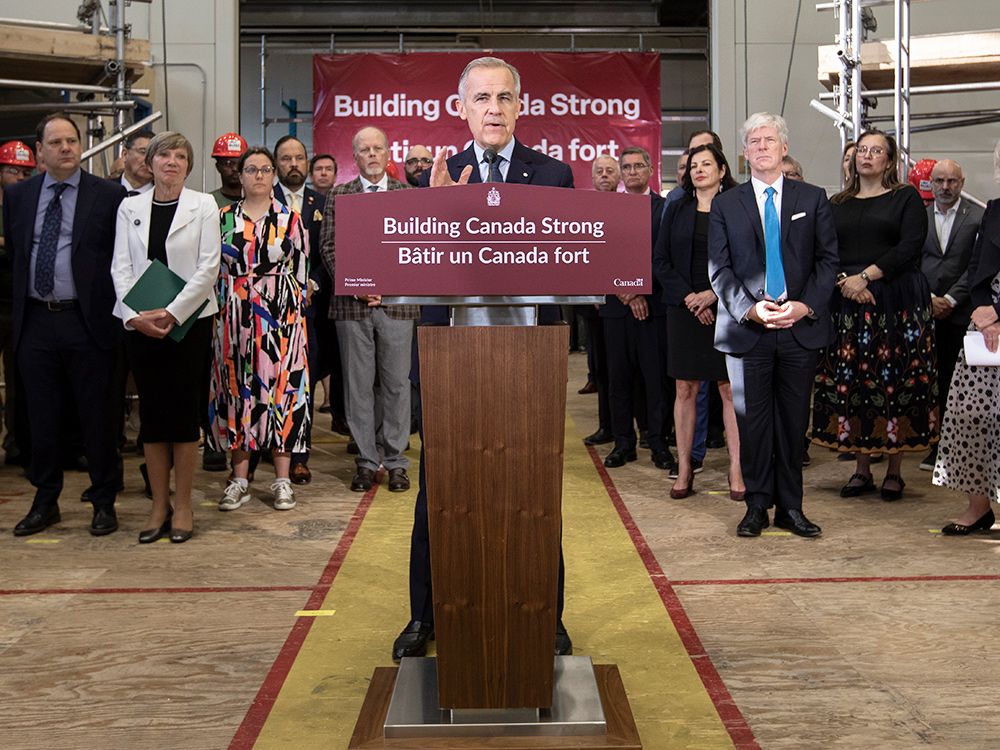
Ahead of their return to Parliament next week, Liberal MPs are suggesting that environmentally minded voters need to be patient, and that the goals of the party haven’t changed.
On Thursday, Prime Minister Mark Carney unveiled the first batch of proposals to go before his government’s Major Projects Office which aims to fast-track major projects deemed to be in the public interest and estimated to add $60 billion to Canada’s economy.
Those included expansion of a liquefied natural gas (LNG) plant in Kitimat B.C. as well a mining projects in the same province and another in Saskatchewan.
Speaking at the Liberal national caucus gathering in Edmonton prior to Thursday’s announcement, MPs insisted the party remained committed to the environment.
“The end goal hasn’t changed. I think we’re always talking about the pace. We’re trying to be pragmatic,” said Calgary-Confederation MP Corey Hogan.
Carney’s announcement stressed the need for the new projects to advance his government’s climate objectives, though Environment Minister Julie Dabrusin has said the government is planning to overhaul Ottawa’s prior greenhouse gas emissions targets reflect the changing economic situation.
Hogan said prior environmental polices need to be re-evaluated in light of continued global uncertainty.
“Certainly when those policies were made, we were not in the same environment. We weren’t in a trade war with the United States. We were looking at a very different economic regime globally,” Hogan said, adding “I think we have to be flexible.”
“Good environmental policy, good social policy is good energy policy, and I think people increasingly understand that.”
While an oil pipeline did not make the initial cut for fast-track projects, Carney indicated the Alberta-based Pathways carbon capture and storage proposal would be under consideration and could be listed in the next set of projects to be announced in mid-November. He also described the Pathways project as a “necessary condition” for a future pipeline.
‘Locking in high emissions’
Environmentalists have criticized carbon capture technology as being overstated in its benefits and allowing oil companies to expand production.
Thursday’s list of projects did not include any renewable energy projects, and drew criticism from those concerned about the carbon footprint of the LNG plant expansion, including Union of B.C. Indian Chiefs Grand Chief Stewart Phillip , who described the proposal as “locking in high emissions.”
“As millions of hectares burn and as thousands of Canadians are forced to evacuate from their homes, we need not look far to see the climate harm all around us; of course, caused by burning fossil fuels,” he said, also criticizing the lack of consultation around the project.
“Expanding LNG in the middle of a climate crisis is not nation-building — it’s a costly gamble Canadians can’t afford.”
Clean Energy Canada, a climate and clean-energy think-tank at B.C.’s Simon Fraser University, said the governments risk relying too heavily on industries it describes as “anchored in the past.”
“Among Canada’s 10 largest non-U.S. trade partners, all of them have net-zero commitments and carbon pricing systems, and roughly half apply carbon border adjustments on imports and have domestic EV requirements reshaping their car markets,” the organization’s president Rachel Doran said in a statement.
‘The ground underneath has shifted’
North Vancouver-Capilano MP Jonathan Wilkinson, who has served as minister of the environment and as minister of natural resources, said economic and green policies were not mutually exclusive.
“The government is going to bring forward a plan on carbon competitiveness, on climate competitiveness,” he said.
“You need to think about how you turn it into an economic opportunity. That fighting climate change is important for the environment, but it’s also important for the economy.”
Saint John-Rothesay MP Wayne Long said changing global realities, most prominently American tariffs, mean the government must adjust from its Trudeau-era policies.
“I think that Canadians are seized with the fact that the ground underneath has shifted. It’s a different world,” he said.
“It’s incumbent on us as a government and as elected politicians to look at everything and do what’s best to secure our country, secure our economy, and build our country.”